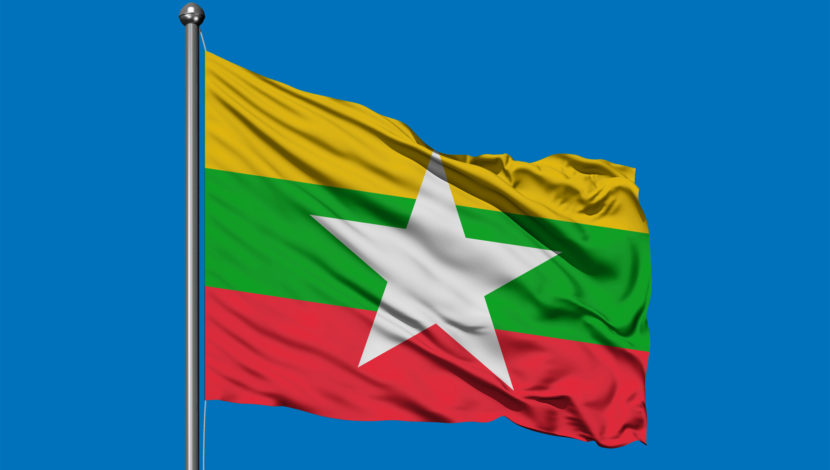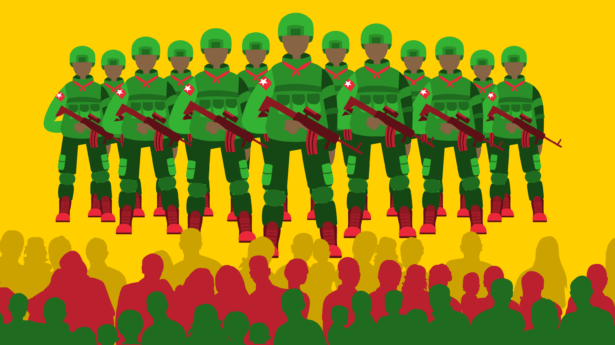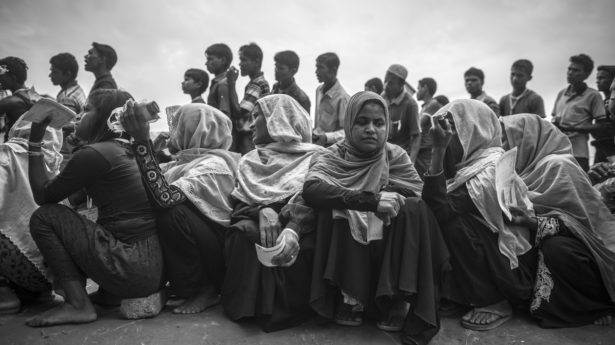The Unitarian Universalist Service Committee advances human rights through grassroots collaborations.
Burmese Junta Tightens Its Grip on Humanitarian Aid

By UUSC Staff on June 28, 2022
For more than a year, the military junta currently in power in Burma (Myanmar) has waged an unrelenting campaign of state terror against their own people—massacring thousands of Burmese pro-democracy activists and laying waste to large stretches of the country through airstrikes targeting ethnic minorities. More than any other factor in Burma, the military regime itself is the cause of the country’s present humanitarian crisis. Their brutal reign is the primary—if not sole—reason why people in Burma currently need humanitarian aid in the first place.
Yet, in spite of these plain and evident facts, the international community is poised to entrust the distribution of further humanitarian aid in Burma to the military regime itself. In early May, the multilateral disaster relief wing of the Association of Southeast Asian Nations (ASEAN)—the ASEAN Coordinating Centre for Humanitarian Assistance (AHA)—met with representatives of the junta to discuss plans for aid distribution. They did not similarly consult with representatives of Burma’s elected government-in-exile or Burmese civil society in making their plans.
Next, the UN Office for the Coordination of Humanitarian Affairs (OCHA) and AHA agreed to collaborate with a junta-appointed task force to conduct surveys for aid distribution inside Burma. As independent observers point out, this ensures in practice that the Burmese military will have “the ultimate decision on where aid is distributed and who can facilitate distribution.” This could empower the junta to withhold humanitarian relief from critics of the regime, discriminate against ethnic minorities, and otherwise manipulate aid distribution to tighten their hold on power.
Burmese civil society is sounding the alarm that collaborating with the military regime in this way would worsen the problem it is ostensibly trying to solve. By sidelining non-state civil society and Burma’s elected representatives, the international community risks strengthening the military regime—even as they are the ones causing the crisis in the first place. As a number of organizations—including several UUSC partners—phrase it in a recent joint statement: The international agencies’ decision puts them “at risk of becoming complicit in the Myanmar military’s weaponization of humanitarian aid, while whitewashing its grave crimes.”
Unfortunately, the risk that the Burmese military could leverage aid as a way to stifle dissent is not purely hypothetical. We’ve seen it before. In the aftermath of the military’s campaign of genocide against the Rohingya people in 2017, international agencies distributed humanitarian aid in Burma through the country’s central government in Naypyidaw. This allowed the Burmese government (at that point complicit in the military’s crimes) to place political conditions on aid, enabling them to use aid as a way of silencing human rights objections to the military’s genocidal policies.
As UUSC has previously described, these agreements with the central government blocked aid from reaching groups critical of the government’s policies and ensured that humanitarian aid distribution mirrored the discriminatory policies already in place across the country. As we wrote in February 2021: “development funds administered through [international aid agencies] operating within the country—including for governance, peace, and humanitarian assistance—are compromised by their MOU access agreements with the Burmese central government. These agreements have effectively forced [international aid agencies] to work under systems that perpetuate exclusion and discriminatory policies toward minorities[.]”
The international community must not repeat this history today. UUSC is working to support our partners in sounding the alarm that international aid agencies are on course to collaborate with the military’s crimes. We are working to amplify our partners’ demands for international agencies to change course now and withdraw their support for the military’s participation in aid distribution. We also urge international agencies to consult with non-state, Burmese diaspora, and civil society actors in developing any humanitarian aid program for the country.
As UUSC members, you can support as well. We need our U.S. members of Congress to take all steps in their power to help bring the Burmese military’s reign of terror to an end. Congress still needs to pass the BURMA Act in order to apply maximum targeted pressure to stop the junta’s atrocities and restore inclusive, federal democracy in Burma. Help us achieve this goal by contacting your representatives today.
Photo Credit: iStock—sezer ozger

